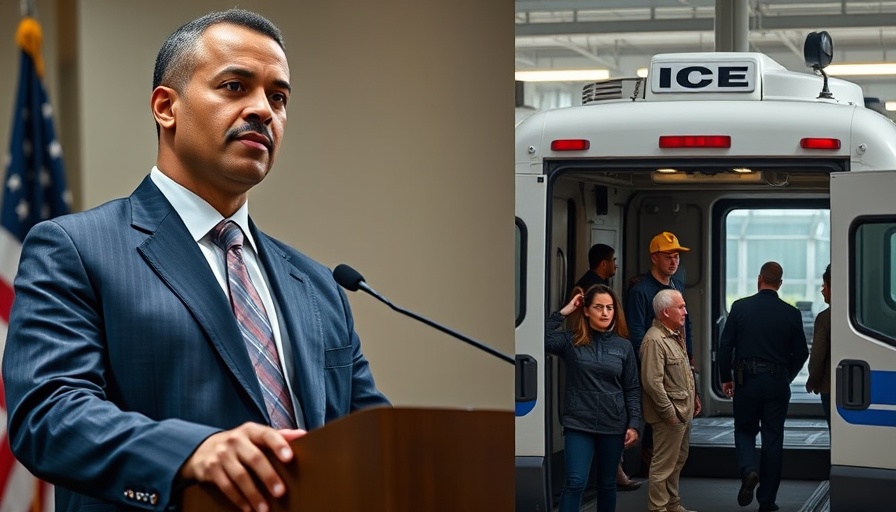
New Era of Immigration Enforcement Under Trump Administration
In a bold commitment to ramp up deportations, Vice President Vance announced that the Trump administration plans to "use everything" it can to increase the number of criminal deportations. This announcement comes as a significant shift in U.S. immigration policy, aiming for aggressive enforcement strategies that promise to alter the landscape of immigration enforcement across the nation.
Understanding the Shift in Deportation Strategies
The current approach marks a strategic departure from the prior administrations' policies, where deportations focused primarily on individuals with criminal records. Vance’s assertion underscores the administration's intent to pursue broader measures, potentially affecting undocumented immigrants regardless of criminal activity.
Trump's directives involve increasing the involvement of multiple federal agencies historically detached from immigration enforcement, such as the IRS and the DEA. This significant expansion aims to reshape how deportations are approached, essentially turning federal agencies into instruments for immigration enforcement. Alongside these changes, there is a notable emphasis on enlisting state and local law enforcement as contributors to federal efforts, which has raised concerns among community leaders about public safety and civil rights.
Public Perspectives: Fear and Confusion Among Immigrants
The announcement has ignited a wave of fear among immigrant communities across the U.S. Many activists warn that the broadened enforcement measures threaten to undermine public trust in law enforcement, further isolating vulnerable populations. In sanctuary cities, where local laws limit cooperation with federal immigration enforcement, the tension between local and federal authorities is escalating. Community organizations are already witnessing an increase in the number of individuals hesitant to engage with law enforcement due to fear of deportation.
Counterarguments: Rhetoric Versus Reality
While the administration touts these measures as a necessary response to perceived immigration crises, critics argue that such rhetoric often fosters a climate of fear. For instance, the Rev. Beth Brown from Lincoln Park Presbyterian Church in Chicago labels the actions as “fear tactics.” She states, “This rhetoric does nothing to solve the issues at hand but instead terrifies communities of color.”
Moreover, the operational realities illustrate a more complicated picture. Despite the ambitious deportation goals, the administration's early efforts have reportedly failed to meet the high targets, becoming mired in logistical challenges and public pushback. Recent studies suggest that while overall arrests have surged, actual deportations have not increased as dramatically as promised.
Operational Challenges Ahead for the Administration
In addition to public backlash, Vance's pledge encounters significant operational hurdles. Experts cite funding limitations as a major barrier—ICE has previously operated with limited budgets, and the full implementation of these broad deportation strategies would require substantial financial support from Congress. Previous efforts for mass deportation highlight the extraordinary expenses involved, as recent reports indicate that deploying military resources for deportations has proven inexpensively burdensome.
Furthermore, the restructuring of the deportation machinery involves a delicate balancing act with respect to human rights standards. Under rules imposed during prior administrations, ICE was mandated to prioritize the humane treatment of detained individuals. Trump’s administration may face scrutiny regarding compliance with these standards as operational practices adjust to accommodate increased detentions.
The International Implications of Increased Deportations
Vance’s call to action has broader geopolitical implications as well. The administration is reportedly negotiating with foreign nations to handle increased deportation cases. These discussions come amid rising tensions with nations that reject or condition the acceptance of deportees. How these international dynamics unfold will significantly affect the success of the administration’s goals and may even lead to increased strife in diplomatic relationships.
What Lies Ahead for U.S. Immigration Policy?
The administration's ambition for mass deportation reflects a significant pivot in U.S. immigration policy, carrying deep implications for future national discussions. Given the mixed reactions from various stakeholders—including city officials, immigrant advocates, and law enforcement—the next steps will likely necessitate navigating complex social, political, and economic landscapes.
Ultimately, whether the Trump administration can effectively ramp up deportations remains to be seen, but it is clear that this renewed focus on immigration enforcement will profoundly affect countless lives across America.
Call to Action: Engage in the Conversation on Immigration
As this critical issue unfolds, it's essential for individuals to stay informed and engaged. Understanding immigration trends and policies impacts communities nationwide. Take the time to educate yourself about local resources, become involved in advocacy efforts, and participate in community dialogues around immigration and human rights. Every voice matters in shaping a more inclusive society.
 Add Element
Add Element  Add Row
Add Row 



 Add Row
Add Row  Add
Add 


Write A Comment